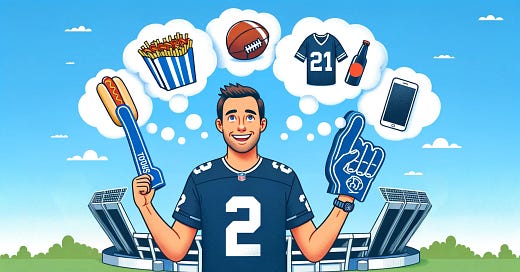Hooked for Life: The Emotional Currency of Sports Loyalty
Why Fandom is a High-Stakes Emotional Investment
Why do fans stick with a team through thick and thin? Why do some rivalries feel like personal battles? Why does the emotional connection between fans and teams often go beyond logic? Sports fandom isn’t just about wins and losses—it’s about identity, tradition, and deep emotional investment. For brands, tapping into these emotional connections isn’t just about visibility—it’s about strategic alignment, measurable impact, and long-term brand equity.
The Emotional Ties That Bind
At its core, sports fandom is rooted in identity and belonging. Fans see their teams as an extension of themselves, their community, or even their family heritage. Whether it’s the generational loyalty of Green Bay Packers fans or the citywide passion for Liverpool FC, teams become a part of people’s personal narratives.
Key psychological drivers of fandom include:
Tribalism: Humans are wired for group affiliation. Supporting a team creates an “us vs. them” mentality, fueling passion and loyalty.
Nostalgia: Memories of childhood games, attending matches with family, or witnessing historic moments cement emotional bonds with a team.
Emotional Investment: The more time, money, and energy a fan puts into a team, the stronger their connection. This is why long-suffering franchises still retain die-hard fanbases.
FOMO & Social Proof: Fans engage more when they feel part of a larger movement. Seeing packed stadiums, viral moments, and social media trends reinforces their loyalty.
Personalization & Access: Fans crave a direct line to their teams—exclusive content, behind-the-scenes moments, or the ability to engage with athletes and brands in an authentic way.
Winning Streaks & Momentum: Fans are drawn to success, but brands should recognize that winning extends beyond the scoreboard—it’s about consistency in engagement, messaging, and community-building.
A Personal Take: The Hook ‘Em Effect
I’ve seen this firsthand. My trips to Texas Longhorns games aren’t just about football; they’re about the shared experience—the sea of burnt orange, the tailgates, the unspoken camaraderie—but also the financial investment I’ve made over the years. Even after a tough loss, the emotional investment remains. Why? The experience extends far beyond the scoreboard. That’s exactly what brands need to understand when entering the sports space—it’s not just about exposure; it’s about becoming a seamless part of the fan experience. This looks different from sport to sport.
How Brands Can Leverage Fandom for Awareness and Engagement
Not all brand activations in sports should be measured the same way. The key is defining intent and aligning ROI metrics to match the goal—whether it's mass awareness, direct conversions, or deepening relationships with a niche audience.
Branded Storytelling with a Purpose: Fans want narratives that enhance their love for the game. Brands should focus on campaigns that complement team heritage, player journeys, or historic moments—rather than generic sponsorship slaps.
Defining the Right Metrics for Success: Not every sponsorship should be judged on broad awareness. A deal focused on premium hospitality, for example, should be evaluated on high-value networking and conversion potential—not social media impressions.
Fan-First Brand Collaborations: Limited-edition jerseys, custom sneakers, or collectibles allow brands to embed themselves into fan culture in a way that feels organic.
Hyper-Personalized Digital & Social Activation: Leveraging AI and fan data to deliver individualized experiences—whether it’s personalized offers, exclusive merchandise, or interactive game-day features.
Cause Marketing That Resonates: Aligning with fan values is critical. Whether it’s sustainability, social justice, or community-driven initiatives, brands that embed themselves into the cultural fabric of a team create lasting impact.
Strategic Hospitality & VIP Access: High-end sponsorships that focus on executive access, networking, and exclusive game-day experiences can drive significant value, even if they don’t always generate broad awareness.
Beyond the Venue: At-Home Fan Engagement: Brands should think beyond stadiums—second-screen experiences, AR/VR activations, and in-home content can amplify fandom in new ways.
Leveraging Consistency & Momentum: Just like winning streaks matter in sports, consistency in brand messaging and long-term partnerships builds credibility with fans. Short-term activations, constant changes in messaging, and a lack of strategy rarely make a lasting impression.
Lessons From Other Industries
Beyond sports, some brands have mastered the art of community-driven engagement:
Apple: Doesn’t just sell products—it builds a brand that users are emotionally attached to because the feeling and somewhat 'reality' that everything is connected across devices.
Nike: Uses athlete-driven storytelling and cultural movements to inspire brand affinity. Millennials all wanted to be ‘Like Mike’. This has changed over time, but it is still a masterclass in strategy.
Subscription-Based Models: Successful brands focus on continuous engagement rather than one-off transactions—sports brands can learn from platforms that build long-term fan loyalty.
The Takeaway: Fandom is a Strategic Asset, Not Just an Audience
For brands looking to reach engaged, passionate audiences, sports fandom presents a unique and powerful opportunity. The most impactful results come from aligning the sponsorship’s intent with the right success metrics. Too often, brands invest in a deal for broad awareness when it’s really about high-value relationship-building—or expect immediate ROI from campaigns designed for long-term brand equity.
The key? Define the win before the deal is signed. Brands that understand the psychology of fandom—and build activations that fit within its ecosystem—can turn sports partnerships into sustainable, high-impact marketing channels. Momentum matters, consistency matters, and defining what winning looks like—before the first activation—makes all the difference.
As always, thanks for reading.




